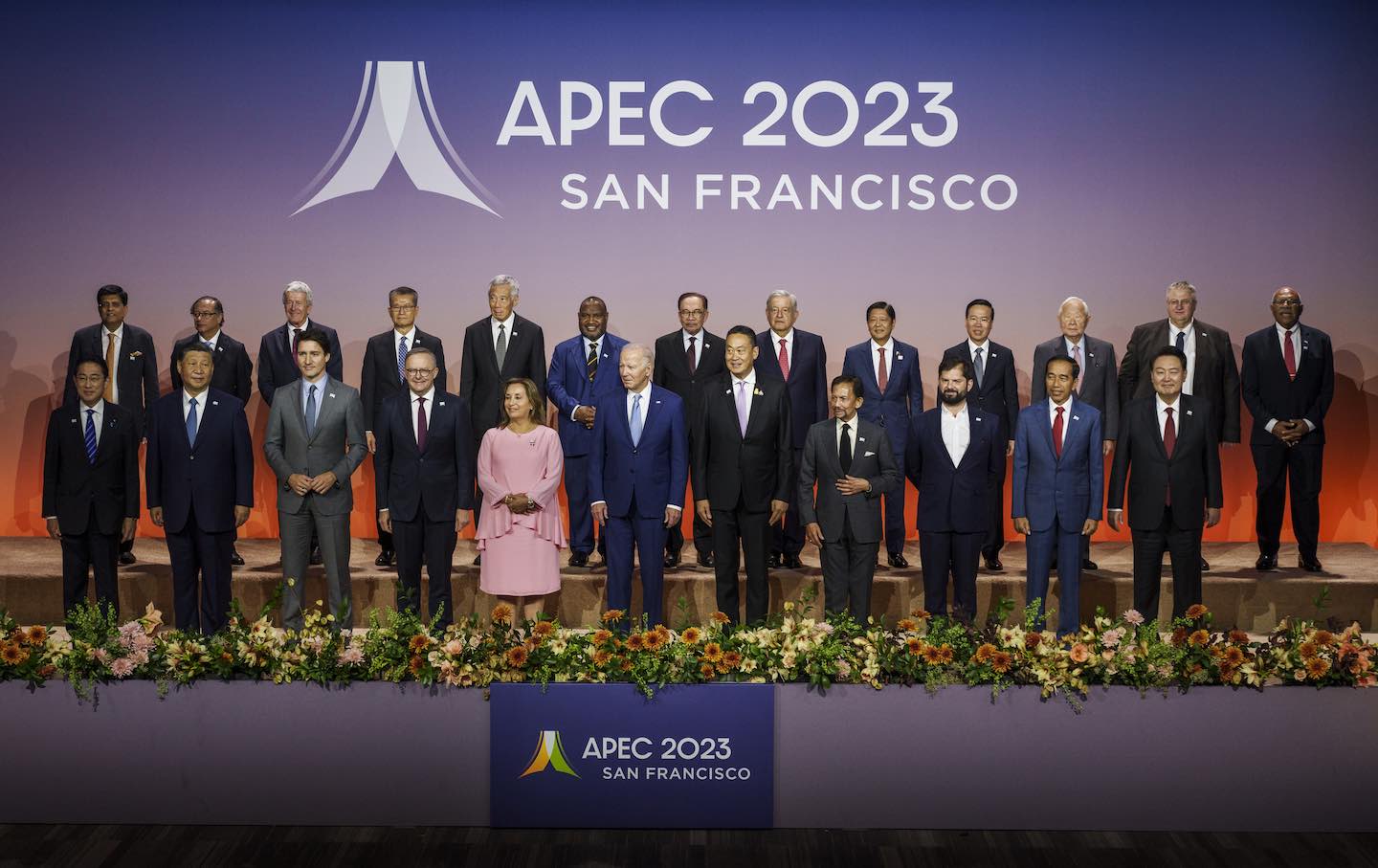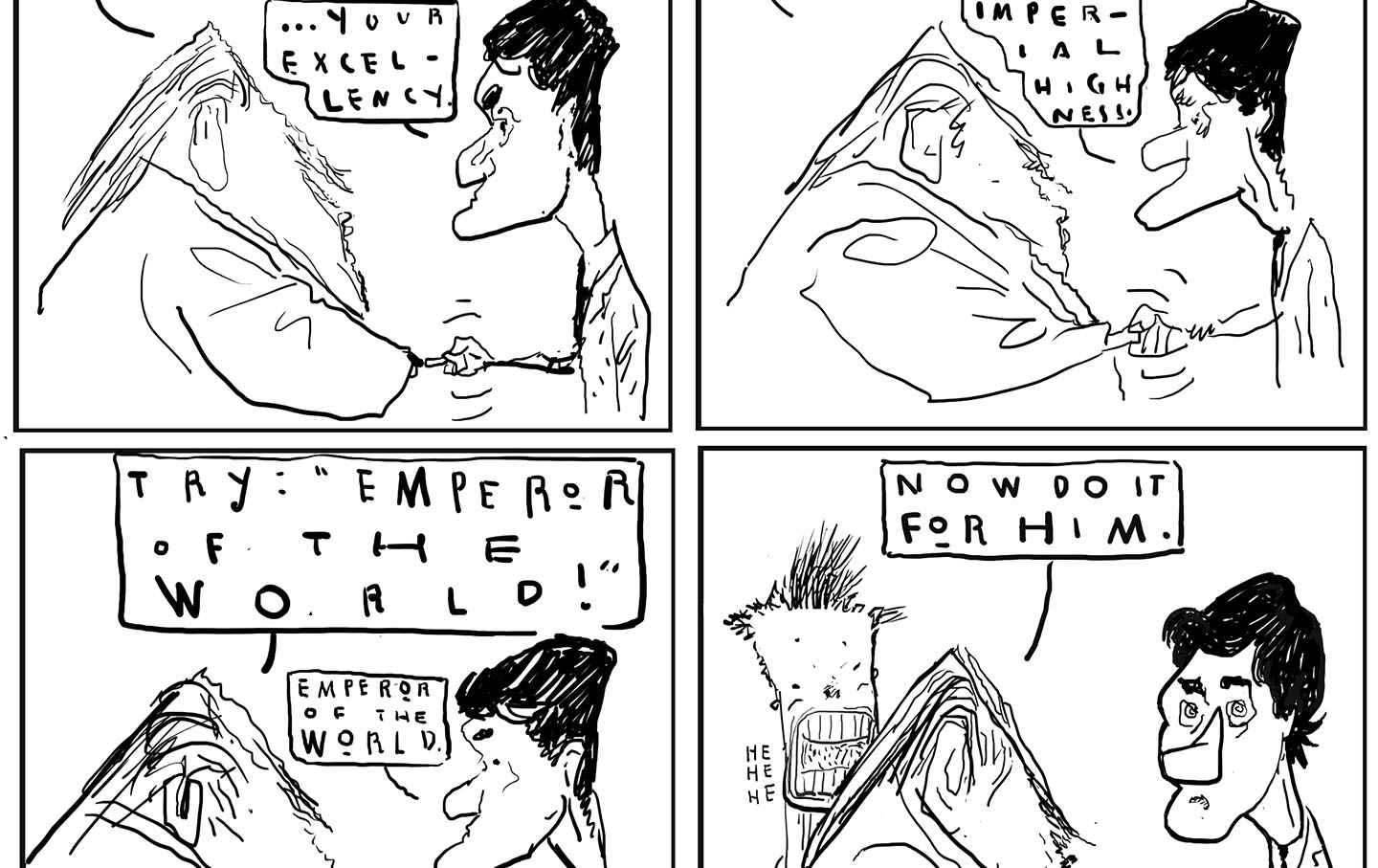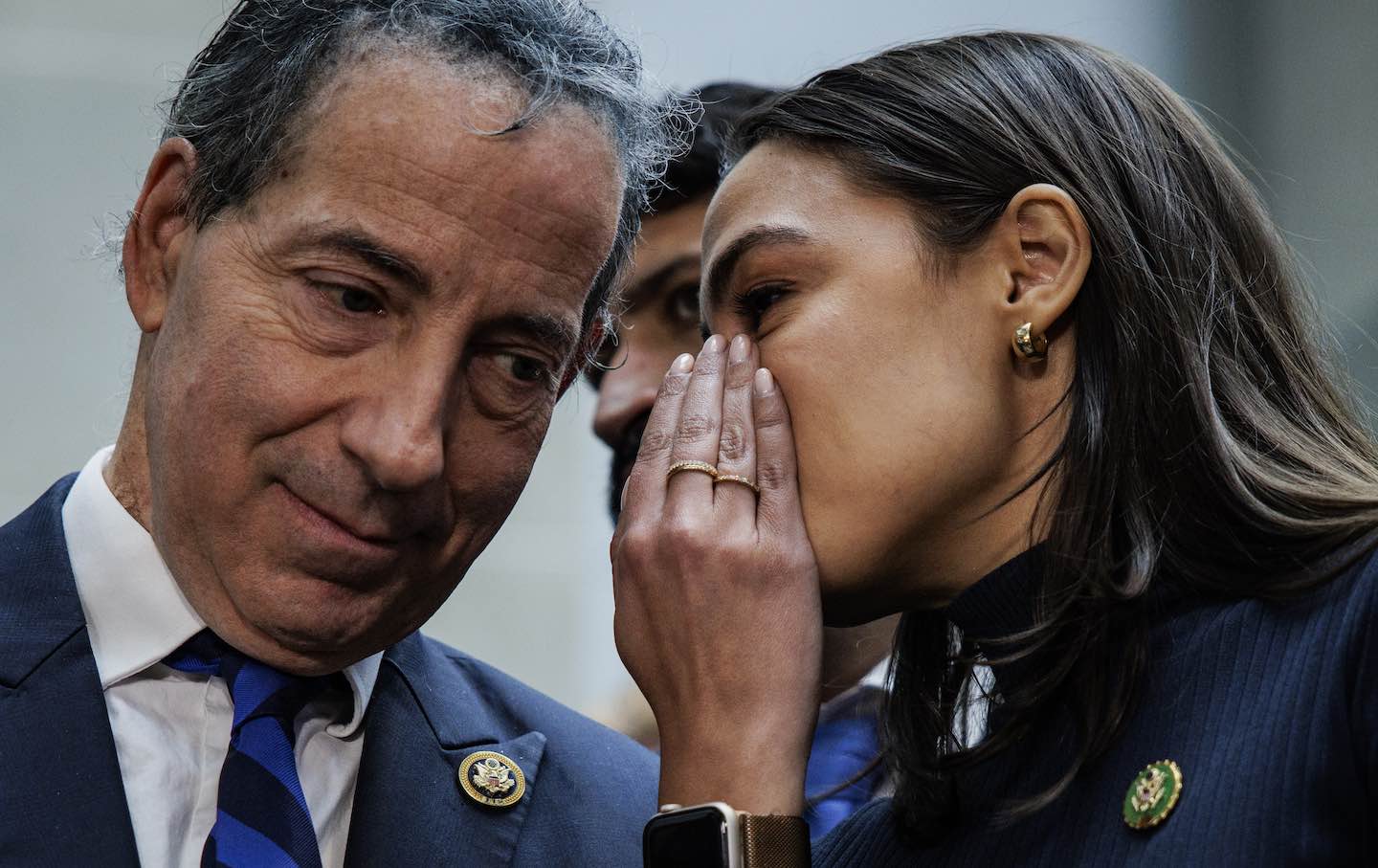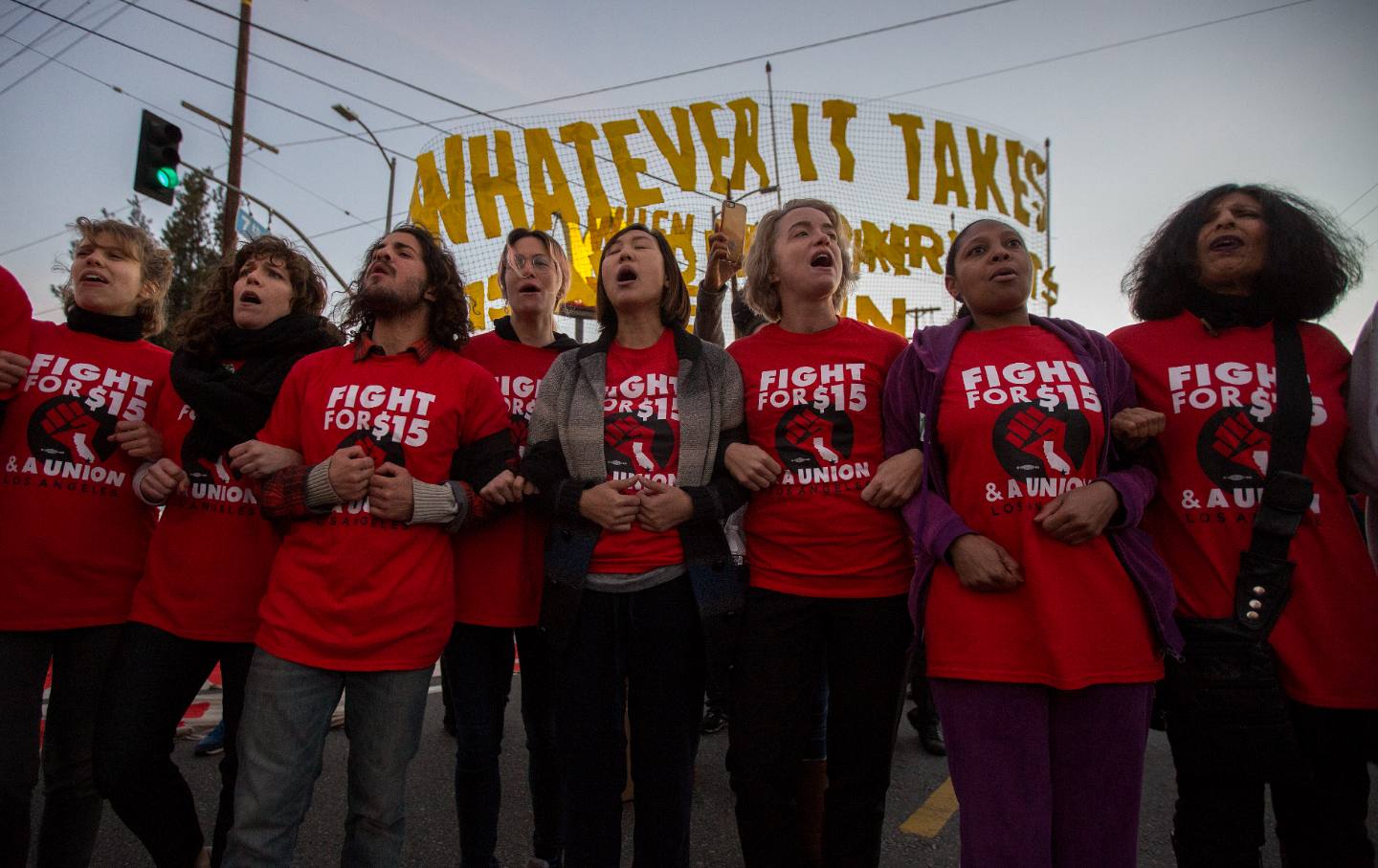San Francisco’s Potemkin Village
For President Biden’s meeting with Chinese President Xi Jinping at the APEC summit in San Francisco this week, Governor Gavin Newsom transformed the city into a façade of prosperity.

World leaders during a group photo at the Asia-Pacific Economic Cooperation summit in San Francisco on Thursday, November 16, 2023.
(Philip Pacheco / Bloomberg)For a brief moment this week, Northern California was the center of the known universe. On Wednesday, President Biden met up with Chinese leader Xi Jinping, during the Asia Pacific Economic Cooperation Summit held in San Francisco and the surrounding Bay Area. The meeting was the first between the two leaders in more than a year. Coming at a time of high tension between the US and China on everything from China’s role in the fentanyl trade to Taiwan, the South China Sea, the use of and controls over artificial intelligence, wars in Ukraine and Israel-Gaza Strip, climate change, and currency manipulation, it was marketed as something of a reset. Its every minute was carefully choreographed, the diplomatic intricacies planned down to the smallest of details.
It was, by accounts, a success. In the aftermath of the summit, the Biden administration announced significant agreements to fight fentanyl trafficking, to cooperate on climate change, and to reopen contacts between the two countries’ militaries. This was, by any reckoning, one of the most consequential meetings between superpower leaders in many years—and it could, conceivably, if there is true follow-through between Beijing and D.C., eventually lead to a loosening of Xi’s ties with his “best friend” Vladimir Putin and lead to something of a reconfiguring of the Great Power dynamics sustaining Russia’s war effort in Ukraine.
Yet there was, amid all the finery, all the pomp and circumstance, all the bonhomie, something of the sense of illusion, maybe even of unreality, pervading the meeting.
Back in 1787, during the reign of Russian Empress Catherine the Great, a military commander by the name of Grigory Potemkin was looking for a way to impress the empress—who happened to be his erstwhile lover as well as sovereign—during her tour of Crimea. Knowing that she put a high premium on the success of modernization projects, and knowing that she also had staked huge political capital on agriculturally modernizing and settling Crimea, which Russian forces had wrested from the Ottoman Empire four years earlier, Potemkin was horrified at the thought that she would tour the region and see a shambles. So, he set up a series of follies: fake villages, cobbled together at speed, complete with fake residents—happy, healthy, politically enthusiastic peasants. The only problem was, they didn’t actually live in those fake villages, and indeed likely weren’t even from the region that Catherine was touring through. Those Potemkin Villages have, over the centuries, come to stand for myriad such disingenuous interventions in the public realm.
Clearly, in the run-up to the summit meeting in San Francisco this week both sides wanted to impress. In the days preceding the get-together, Chinese state media reportedly flooded the zone with stories about positive interactions Chinese individuals and institutions have had with Americans over the decades, and pushed to the fore calls for a thawing of relations between the two superpowers. It’s possible, of course, that the Chinese state authorities have simply had a bona fide change of heart about the United States and, more generally, the West after years of railing about colonial arrogance, about decadence, about China being denied its rightful spot in the world. It’s also possible, however, that a China facing a rolling series of economic crises—including rising unemployment and a growth rate that, since the pandemic, has been tapering off of its decades-long highs—and rumbling discontent about the increasingly authoritarian nature of Xi’s rule, is starting to realize that an endless cold war with the US would be hugely expensive and, quite possibly, mutually unwinnable. In this context, putting on at least a façade of friendliness, a Potemkin Village smile, at the APEC summit makes a whole lot of sense.
America, on its side, wanted to present the most spruced-up vision of San Francisco it could muster, to impress on China and the other APEC participants the glories of the American urban experience. In the days leading up to the summit, huge homeless encampments, open air drug markets, and trading grounds for stolen goods were swept away from the United Nations Plaza. In their place sprang up a skate park, dance performances, and other emblems of an affluent, calm, successful society. After all, it really wouldn’t do for the overseas leaders to see how degraded so much of the American urban infrastructure and social safety net has become in recent decades. It is hardly an endorsement of America’s claim to ongoing greatness to have a major international summit taking place surrounded by cardboard shacks, tents, needles in the gutters, and hundreds of destitute residents outside.
If the rapid renovation of the United Nations Plaza isn’t a Potemkin Village, I don’t know what is.
Governor Newsom gave a nod to the transformation when he spoke of an ongoing effort, coordinated at local, state, and federal levels to clean up the city—though he argued that these efforts predated the APEC meeting. Yet residents of nearby neighborhoods reported that the homeless were simply being shunted from the area of the United Nations Plaza into streets in other neighborhoods. In the ongoing calculus of pain, the total numbers haven’t decreased in San Francisco; it’s just that the pain was redistributed to move it further away from the glare of the international media spotlight.
Nearly 1 percent of San Francisco’s population is homeless on any given day, according to the city’s Controller’s Office, placing it just behind Los Angeles and Oakland in the cities with the worst homelessness rates in the nation. The epicenter of the Silicon Valley boom, it has one of the highest concentrations of wealthy elites of any city on earth. Yet over the past decade it has shamefully failed to address the overlapping crises of spiraling mental health problems, soaring drug addiction, and unaffordability-of-housing—oftentimes falling back on its reputation as a liberal haven not to carry out more effective interventions, but to do nothing. Being pro-homeless has come to mean, in San Francisco at any rate, not really helping the poor, the addicted, and the mentally ill find better, more supportive, living situations, but instead simply turning a blind eye to the growing squalor. As a result, in many neighborhoods, people congregate in growing shantytowns that look more like images from cities in the poorest countries on earth rather than other major cities in other powerful, wealthy democracies.
Governor Newsom is correct that San Francisco has, belatedly, gotten serious about the encampments, as are cities all over California in the face of soaring public fury at the blight. But he’s not really correct that either the city or the state are truly getting a handle on the underlying causes of the problem. Indeed, in Sacramento County, due to the chronic shortage of affordable housing and the escalating societal crises of addiction and mental illness, there are now more homeless than there are in San Francisco. For every one person recently housed, as many as three are thought to become homeless. In San Jose, the number is three new homeless for every two newly housed residents.
All of this represents an epochal breakdown of the social compact. Simply sprucing up the United Nations Plaza for a few days so that an international summit can proceed smoothly doesn’t address the roots of the problem. It does, however, look good for the cameras. Grigory Potemkin would, I am sure, have approved.








